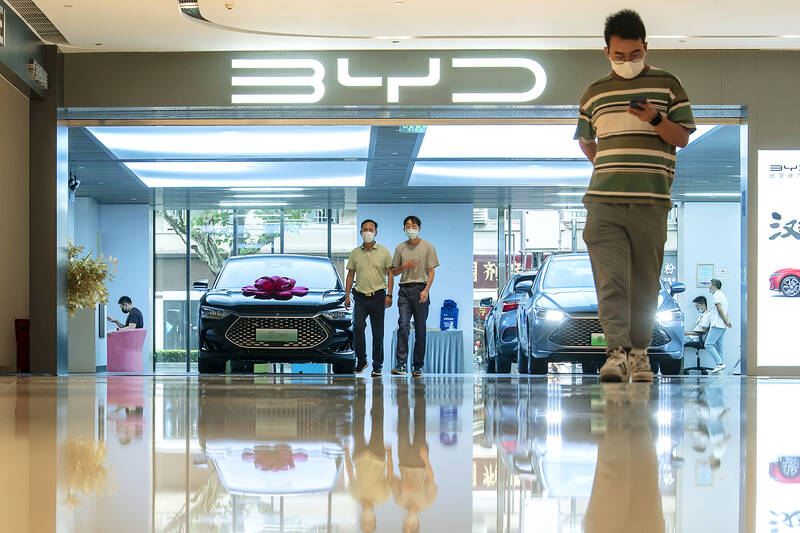Traders rushed to sell BYD Co (比亞迪) after Warren Buffett’s Berkshire Hathaway Inc trimmed its stake in the Chinese electric vehicle (EV) maker, fearing that the legendary investor might be gearing up for an eventual exit after a decade as the company’s most notable backer.
BYD shares yesterday plunged as much as 13 percent in Hong Kong, the most in seven weeks and the worst performance on the benchmark Hang Seng Index. The selling followed Berkshire’s filing to the exchange late on Tuesday notifying that the firm reduced its holding of BYD’s Hong Kong-listed shares to 19.92 percent from 20.04 percent on Wednesday last week.
Speculation has been swirling for weeks about Buffett’s intentions, ever since a 20.49 percent stake — identical to the size of Berkshire’s last reported BYD position as of December last year — entered the Hong Kong’s central clearing and settlement system last month, a move that is often seen as a precursor to share sales. BYD stock has fallen more than 25 percent from a July high.

Photo: Bloomberg
“Investors could interpret this as the beginning of Berkshire closing its position in BYD,” said Bridget McCarthy, a market research analyst at hedge fund Snow Bull Capital Inc. “I would expect arguably one of the world’s greatest investors to take some profits after over a decade, especially on his highest-returning investment, percentage-wise.”
Buffett has sold about 6.3 million shares since June 30 through Wednesday last week, calculations based on BYD’s interim report and the investor’s latest filing showed. Berkshire, which first bought 225 million shares in September 2008, has been by far the largest shareholder in the EV giant.
The investment has also proved hugely lucrative as BYD shares have soared more than 2,000 percent since his initial purchase.
Investors view BYD, China’s biggest EV maker, as a bellwether for the sector. The company reported a jump in profit for the first half of the year as record output and sales shielded it from COVID-19 disruptions and supply-chain pain.
The automaker’s fundamentals suggest BYD might be able to endure further selling from Buffett, especially as investors pour into China’s green energy sector on bets the industry will benefit from Beijing’s policy push.
The auto industry has also been a key recipient of a range of tax and consumption incentives as authorities seek to dominate the shift away from combustion engines and accelerate the economy’s recovery.
BYD’s business model has improved significantly from the time Buffett first invested, said Andy Wong (黃耀宗), a fund manager at LW Asset Management Advisors Ltd (利達資產管理) in Hong Kong.
“Despite the short term share price struggle, there is value to invest in the company with its solid business model in the medium to long term,” he said, adding that some investors might have been waiting for a correction to buy.
A BYD official, in comments to China’s 21st Century Business Herald, said there is “no need to overinterpret” the stake sale, and added that the company’s operations remain normal.
As of Tuesday, BYD was the world’s second-most richly valued automaker, with its price to estimated earnings ratio below Li Auto Inc (理想汽車), a Chinese EV start-up listed in the US, and higher than Tesla Inc.

TRADE WAR: Tariffs should also apply to any goods that pass through the new Beijing-funded port in Chancay, Peru, an adviser to US president-elect Donald Trump said A veteran adviser to US president-elect Donald Trump is proposing that the 60 percent tariffs that Trump vowed to impose on Chinese goods also apply to goods from any country that pass through a new port that Beijing has built in Peru. The duties should apply to goods from China or countries in South America that pass through the new deep-water port Chancay, a town 60km north of Lima, said Mauricio Claver-Carone, an adviser to the Trump transition team who served as senior director for the western hemisphere on the White House National Security Council in his first administration. “Any product going

High above the sparkling surface of the Athens coastline, the cranes for building the 50-floor luxury tower centerpiece of Greece’s future “smart city” look out over the Saronic Gulf. At their feet, construction machinery stirs up dust. Its backers say the 8 billion euro (US$8.43 billion) project financed by private funds is a symbol of Greece’s renaissance after the years of financial stagnation that saw investors flee the country. However, critics see it more as a future “ghetto for the rich.” It is hard to imagine that 10km from the Acropolis, a new city “three times the size of Monaco”

STRUGGLING BUSINESS: South Korea’s biggest company and semiconductor manufacturer’s buyback fuels concerns that it could be missing out on the AI boom Samsung Electronics Co plans to buy back about 10 trillion won (US$7.2 billion) of its own stock over the next year, putting in motion one of the larger shareholder return programs in its history. South Korea’s biggest company would repurchase the stock in stages over the coming 12 months, it said in a regulatory filing on Friday. As a first step, it would buy back about 3 trillion won of paper starting today up until February next year, all of which it would cancel. The board would deliberate on how best to effect the remaining 7 trillion won of buybacks. The move

In a red box factory that stands out among the drab hills of the West Bank, Chat Cola’s employees race to quench Palestinians’ thirst for local products since the Gaza war erupted last year. With packaging reminiscent of Coca-Cola’s iconic red and white aluminum cans, Chat Cola has tapped into Palestinians’ desire to shun brands perceived as too supportive of Israel. “The demand for [Chat Cola] increased since the war began because of the boycott,” owner Fahed Arar said at the factory in the occupied West Bank town of Salfit. Julien, a restaurateur in the city of Ramallah further south,